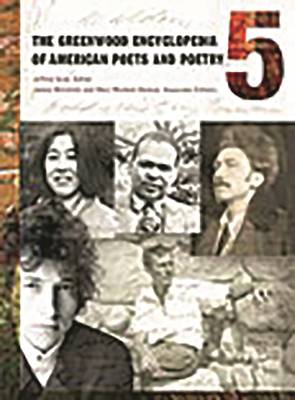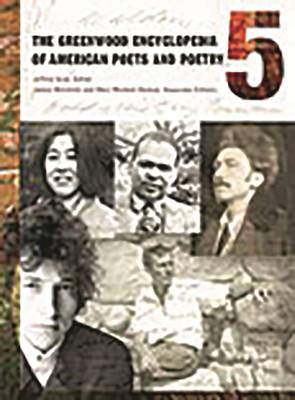
- Retrait gratuit dans votre magasin Club
- 7.000.000 titres dans notre catalogue
- Payer en toute sécurité
- Toujours un magasin près de chez vous
- Retrait gratuit dans votre magasin Club
- 7.000.0000 titres dans notre catalogue
- Payer en toute sécurité
- Toujours un magasin près de chez vous
The Greenwood Encyclopedia of American Poets and Poetry
[5 Volumes]
Mary McAleer Balkun, Jeffrey Gray, James McCorkle
Livre relié | Anglais
533,45 €
+ 1066 points
Description
The most comprehensive reference on American poetry ever assembled, this encyclopedia includes more than 900 alphabetically arranged entries, contributed by approximately 350 scholars. Written for students and general readers, the set covers poetry from the colonial era to the present, devoting special attention to contemporary poets and their works. Multicultural in scope, the encyclopedia covers poets, genres, critics, poetic terms, and movements. Its entries range from Caribbean to Confessional Poetry, from Dada to Eco-poetics, from Gay and Lesbian Poetry to Literary Magazines, New Formalism, and more.
The most comprehensive reference on American poetry ever assembled, this enormous encyclopedia includes more than 900 alphabetically arranged entries by roughly 350 scholars. Other references on poetry typically cover a particular period, or survey a limited range of authors, or they do not cover poets, and works, and techniques. This encyclopedia surpasses existing works by considering the entire range of American poetry, overviewing major and minor authors, and combining biographical and critical entries with entries on a wide range of topics. Written for students and general readers at a time when poetry is central to the curriculum, the set covers material from the colonial era to the present, devoting special attention to contemporary poets and their works. Multicultural in scope, the encyclopedia provides entries on numerous poets from diverse ethnic backgrounds. It also devotes considerable attention to women poets and to poets who are just beginning to establish their reputations. In addition, it relates American poetry to its social, historical, political, and cultural contexts. The extensive experience of the volume editors and contributors is supplemented by an advisory board of some of the world's most distinguished scholars, including: Steven Gould Axelrod; Paula Bernat Bennett; Charles Bernstein; Pattie Cowell; Henry Louis Gates, Jr.; Donald Marshall; Marjorie Perloff; John Shields; Lorenzo Thomas; Robert von Hallberg; And Cheryl Lawson Walker. Among the many poets discussed are: Amos Bronson Alcott; Maya Angelou; Amiri Baraka; William Bronk; Alice Cary; Billy Collins; Stephen Crane; Countee Cullen; James Dickey; Emily Dickinson; Rita Dove; Bob Dylan; Peter Everwine; Robert Frost; Sandra Gilbert; Allen Ginsberg; Dana Gioia; Robinson Jeffers; N. Scott Momaday; And many others. In addition, the Encyclopedia includes entries on such topics as: African American Slave Songs; Agrarian School; Asian American Poetry; Beat Poetry; Black Arts Movement; Blues; Chicano Poetry; Digital Poetry; Ekphrastic Poetry; Epic; Ethnopoetics; Experimental Poetry and the Avant-Garde; Feminist Poetics; Light Verse; Performance Poetry; And many others. Features: Includes more than 900 alphabetically arranged entries.; Brings together the work of roughly 350 expert contributors.; Covers American poetry from the colonial era to the present.; Includes entries on major canonical poets.; Highlights the work of poets who are just beginning to establish their reputations.; Gives full attention to poets from diverse racial and ethnic backgrounds.; Notes the achievements of women poets.; Relates American poetry to its historical, social, political, and cultural contexts.; In addition to biographical entries, the encyclopedia includes entries on poetic genres, schools, movements, terms, periods, theories, practices, and other topics.; Includes an alphabetical list of entries.; Lists entries grouped in topical categories.; Entries cite works for further reading.; Entries are fully cross-referenced.; Provides a selected, general bibliography of broard studies of American poetry.; Includes a detailed index. Benefits: Helps students understand and appreciate the precise and creative use of language.; Assists students in using poetry to understand social, political, and cultural issues.; Develops an appreciation for the achievements of poets from diverse cultural groups.; Serves as a model for student analysis and writing.; Develops research skills by directing students to additional sources of information.; Helps students learn to compare and contrast different poetic practices and movements.; Teaches students terms and concepts central to the critical analysis of poetry and literature. Because poetry is central to the curriculum and is a valuable resource for learning about language, this authoritative encyclopedia will be consulted extensively by high school students and teachers. In addition to school libraries, public libraries need to purchase this work to support student research and to meet the interests of general readers.Spécifications
Parties prenantes
- Auteur(s) :
- Editeur:
Contenu
- Nombre de pages :
- 2012
- Langue:
- Anglais
Caractéristiques
- EAN:
- 9780313323812
- Date de parution :
- 30-12-05
- Format:
- Livre relié
- Format numérique:
- Genaaid
- Dimensions :
- 248 mm x 286 mm
- Poids :
- 6586 g

Les avis
Nous publions uniquement les avis qui respectent les conditions requises. Consultez nos conditions pour les avis.






